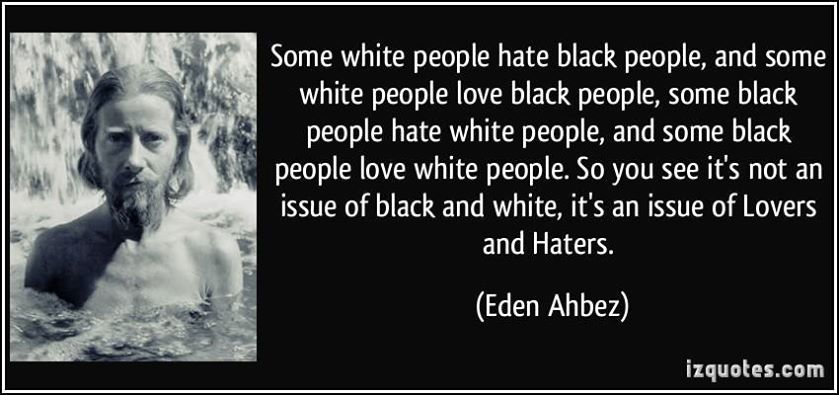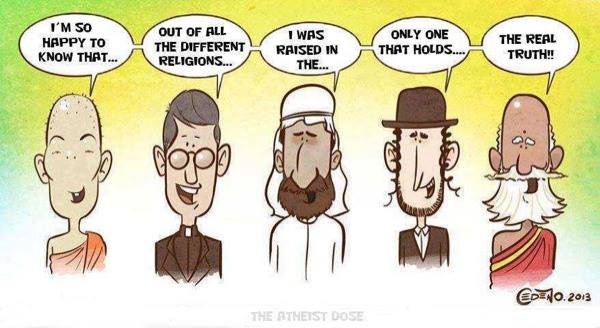I have a mantra on life that I wish to share with you: Ignorance enslaves, breeding hatred and extremism; while knowledge liberates, breeding compassion and understanding.
Fundamentalism, which I define it to be a very non-pluralistic approach operating on absolutes, stems from ignorance – and thus only breeds negativity. It is a venomous disease that kills positivity, and needs to be identified and cured on a very personal level.
As a Muslim, who in his earlier days had adopted quite a fundamentalist approach, I have come a long way by internalizing a basic yet painful truth: I, definitely, do not have all the answers, hence different point of views are not only necessary for my own growth and evolution (which to me, is the prime purpose of life) but also that embracing diversity as one of God’s signs is the only solution of progress and co-existence. I have come to realize that only those who hold a very shallow outlook are afraid of diversity in thought, for it threatens ungrounded and unresearched prejudices and beliefs.
Bertrand Russell, very wisely, puts it as:
The whole problem with the world is that fools and fanatics are always so certain of themselves, and wiser people so full of doubts.
So, here are 4 major factors that fuel fundamentalist thought:
- Lack of Independent Study and Exposure to Different Schools of Thought
The biggest factor of fundamentalism and dogmatism is that most people do not critically examine the religion (or any other ideology, for that matter) believe in. Naively accepting whatever is told to them by other people, they lack the much needed exposure to different schools of thought that has the tendency of humbling one’s self down.
So, when such a blind belief is threatened by an opposing point of view, these people, unable to prove their point by reasoning, resort to insults and bad language; or in extreme cases, resort to violence in order to protect that belief and to gain a feeling of supremacy and self-worth. Cognitive dissonance, anyone?
- Inconsistency in Approach
Whether it be theism or atheism, dogmatism and fundamentalism exists on both sides of the coin. This is a bitter truth that I’ve observed over the years. One would expect atheists and “progressive” religionists to be more open-minded towards those who differ from their perspective, but this, unfortunately, is not true for all of them.
Ironically, they become what they detest the most: hardliner preachers of their “religion”, looking down upon anyone and everyone who differs. Of course, I do not mean to imply that every atheist or theist behaves like that, which brings me to my next point…
- Generalizations and Thinking in Absolutes
Generalizations play a key role in fundamentalism and dogmatism: Muslims are terrorists; atheists are proud and arrogant; Shias are Kafirs; Black people are thugs; White people – racists and imperialists! Fundamentalists perceive everything in a black and white manner, refusing – or simply uninterested- to observe the many shades of grey within. The reality, however, is that the more you encounter how diverse people are, their way of living, their way of thinking, their way of worshiping (or the lack thereof), the more you broaden your mind and cease thinking in absolutes.
- Possessing the Key to “the Sole Truth”
Some religious people are brought up believing that their path to God is the only correct path worthy of salvation, and this brainwashing turns some (if not most) of them into bigots. Some atheists also believe that atheism is the only rational metaphysical philosophy, and this brainwashing turns some (if not most) of them into bigots. What needs to be eliminated is the egoistic belief of having a monopoly on Truth, even the idea of there being a Sole Truth out there. Like Rumi says,
The truth was a mirror in the hands of God. It fell, and broke into pieces. Everybody took a piece of it, and they looked at it and thought they had the truth.
But it’s challenging – it’s challenging because having a monopoly on Truth and looking down upon others is a great boost for the ego and a major source of self-worth for some. In addition, this feeling of superiority due to having the key to “the Truth” may well be the most defining part of their personality, making it even harder for them to abolish this self-centered belief.
However, people who are introspective eventually realize the need for pluralism and tolerance. They analyze the contradictions in their own approach and work on continually reforming themselves, instead of finding faults with others.
These folks strive for consistency in approach. If they detest something in others, they make it sure that that negative trait is not a part of their own personality. Automatically, they automatically become more tolerant, more compassionate, more humble, and above all, they are able to acquire peace within themselves which, ultimately, is the prime purpose of any philosophy on life. As Gandhi once said,
“Be the change you wish to see in the world.”
Ro Waseem is a Reformist Muslim who believes in the power of writing for change. His articles have been published on Huffington Post, Onfaith, Express Tribune, among others. Read more of his articles here.
—
Help Share This!


















